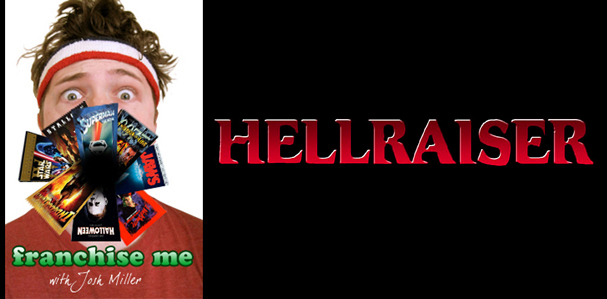
Hollywood loves a good franchise. The movie-going public does too. Horror, action, comedy, sci-fi, western, no genre is safe. And any film, no matter how seemingly stand-alone, conclusive, or inappropriate to sequel, could generate an expansive franchise. They are legion. We are surrounded. But a champion has risen from the rabble to defend us. Me. I have donned my sweats and taken up cinema’s gauntlet. Don’t try this at home. I am a professional.
Let’s be buddies on the Facebookz!
The Franchise: Hellraiser — concerning a supernatural puzzle box (and those humans foolish/unlucky enough to solve it) that opens a doorway to the hellish dimension of Pinhead, the most prominent member of the Cenobites, powerful beings who desire human souls for sadomasochistic experiments. Adapted from Clive Barker’s novella The Hellbound Heart, the franchise spans nine films, from 1987 to 2011.
previous installments
Hellraiser
Hellbound: Hellraiser II
Hellraiser III: Hell on Earth
Hellraiser IV: Bloodline
Hellraiser: Inferno
Hellraiser: Hellseeker
Hellraiser: Deader
Hellraiser: Hellworld
The Installment: Hellraiser: Revelations (2011)
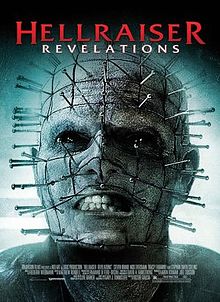
The Story:
We open with some shaky camcorder POV found-footage shenanigans, with two friends, Steven Craven and Nico Bradley – get it?! Craven and Bradley; as in Wes Craven and Doug Bradley! Wait, Wes Craven? – on their way to Tijuana for the kinds of reasons that two young men go to Tijuana. It is jokes and good times while they’re in the car, but then we cut to them arguing later on, and then cut to them in a dank room where Nico opens the Lament Configuration and Pinhead shows up. Then we jump forward in time, one year, to a dinner party where Steven and Nico’s respective loved ones are hanging out. Turns out that Nico and Steven never returned from Tijuana and are presumed dead. Their belongings, including Steven’s video camera and the Lament Configuration, were returned to the parents, and long story short, we wind up with two stories here: Story A) the movie-within-a-movie found-footage story of Nico and Steven in Tijuana, and Story B) when Steven miraculously arrives at the dinner party, and winds up holding everyone hostage with a shot-gun. See, in Mexico Nico “accidentally” killed a hooker, which leads to the boys getting the Lament Configuration. Nico is taken away by the Cenobites, and Steven is sent into a spiral of depression and hooker bangin’. Steven ends up killing a hooker himself, and like Frank in Hellraiser Nico escapes from the Cenobites and needs Steven’s help murdering more hookers in order to reconstitute his flesh. Our big twist comes later in the film when we discover that Steven (in the present) is actually Nico wearing Steven’s flesh (like Frank did with Larry). Nico had betrayed Steven in Tijuana, which caused Steven to give himself over to the Cenobites — at which point Steven becomes, wait for it, wait for it, Mini-Pinhead! Now we have two Pinheads! Yay! Then the movie ends. And your bowels uncontrollably release.
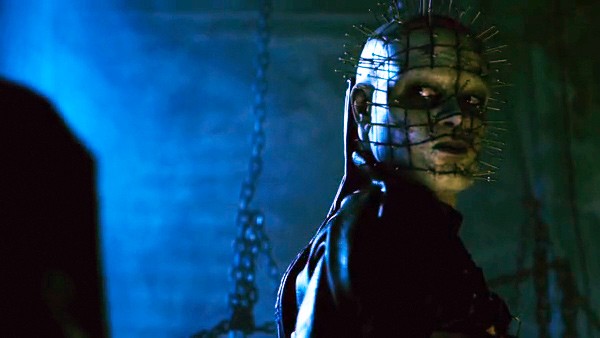
What Works:
Presumably the vast majority of you reading this already know the backstory on Hellraiser: Revelations, but for those who don’t — Revelations is what’s known in the ‘the Biz’ as an ashcan copy, something that a company makes for the sole purpose of retaining rights/trademarks that are otherwise about to expire; generally not even bothering to release the finished product, sending it immediately to the “ashcan,” if you will. In this case, the Weinsteins (who have controlled the franchise’s rights since Miramax distributed Hell on Earth) couldn’t get their shit together on the Hellraiser reboot fast enough and were in danger of losing their claim. The pre-production stage of the film was so hurried and slipshod that Doug Bradley passed on the project — let’s keep in mind that this is the same guy who said yes to Hellseeker, Deader, and Hellworld; so that should let us know how horrifyingly half-ass this production must have seemed close-up. Not to mention that despite having his name used in relation to the previous sequels, even though he personally had nothing to do with anything after Bloodline, Barker was so aghast to see Revelations being marketed with a “From the mind of Clive Barker” tag that he sent out this tweet:
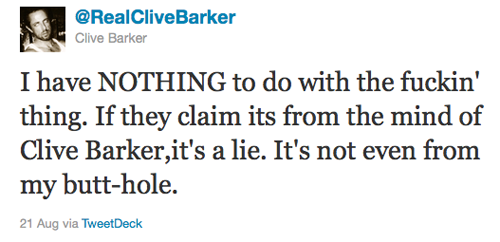
So knowing all this, I have to say, while Revelations is not a good film, it isn’t quiet the holocaust of cinema I was expecting it to be. The franchise was already in a pretty terrible place, so it’s not like Revelations is a gut punch in quality. For something that was blatantly dashed off with the utmost lack of concern, there are elements here that actually could have made for a semi-acceptable Hellraiser sequel. The flashback story of Steven and Niko in Mexico is pretty much just a remake of the Frank and Julia storyline in the first film, but tweaked to be about two friends instead of two lovers. Far from original, this nonetheless could have carried some entertainment value now that the franchise has moved so far away from the idea of a character escaping the Cenobites and needing blood/flesh to reconstitute themselves (which had been very important to the mythology in the first two films). And Steven asking to become a Cenobite is actually something we haven’t seen addressed yet, as both Channard and Elliot Spencer seemed to be turned into Cenobites against their will. So that’s novel.
Wikipedia lists the budget for Revelations at $300,000. If that’s true, this movie is actually more impressive than anyone is giving it credit for. The FX aren’t good, but we still get decent representations of all the old classics, like chains tugging at flesh (though I could’ve done without the lame CG glowing FX added to the puzzle box transformations). It was also nice to see the return of the magic hobo character from the first film; giving Nico and Steven the puzzle box and talking up the Cenobites as “angels, conductors, surgeons and more.”
Of course, all this is just a reaction to my low expectations – like Mariana Trench low – based on that abysmal trailer that surfaced earlier in the year.
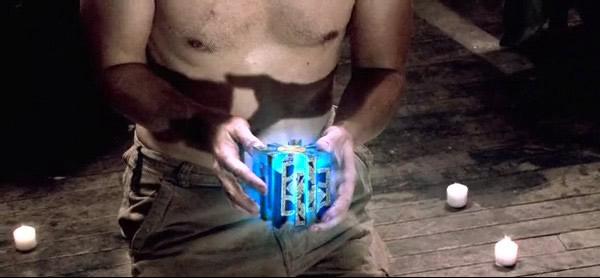
What Doesn’t Work:
While anyone who gets truly up in arms about Revelations is cluelessly deluding themselves about the quality of the previous three installments in this franchise, the ninth Hellraiser film does have two unacceptable and insurmountable problems working against it:
1) It looks cheap as holy fuck.
Not having money should never be held against a film unless having grand spectacle is an intrinsic part of the concept (a $1 million Lord of the Rings trilogy would not have flown), so I’d like to note that I’m drawing a distinction between “low budget” and “cheap.” Hellraiser looked “low budget.” Revelations looks cheap. This franchise had descended to a low, low point, but the visual quality of this film just looks wrong; like a syndicated genre TV show one might have found in the early 00’s. And apparently Steven and Nico found the one area of Tijuana that has absolutely no one else in it, and the one dingy strip club that likes to play its music so quietly that no one needs to even raise their voice slightly to carry on a conversation.
2) It doesn’t have Doug Bradley.
Revelations goes a long way in demonstrating the importance of a franchise’s “face.” A lot can be stripped away from a franchise as long as the face remains intact. The Bond franchise has succeeded through its many face changes because it left its other popular elements fully intact. Since Hellbound we’ve been losing a lot in FX quality, dialogue quality, actor quality, story quality, mythos quality, but we at least still had Doug Bradley soldiering through the mire with us. And I can guarantee you, that even with unacceptable Problem #1, if Bradley had been here this would’ve surely ranked alongside Hellseeker in quality, if not above it — at least stuff happens in Revelations. I’m not going to lambast Stephan Smith Collins here, because he is just an actor trying to get work, and I’m sure getting a chance to play a famous character like Pinhead was a great opportunity; no actor is going to look back decades later and say, “I wish I hadn’t played Pinhead in that shitty movie.” But the fact remains that Collin’s Pinhead is just no bueno. It is a tall order to swap out the face of a horror franchise nine films into a series. Only Robert Englund is more directly tied to a modern horror monster than Bradley. It wouldn’t be impossible to replace Bradley, but Collin’s does not feel like the outcome of an earnest search. I mean, to replace Robert Englund – who is a lovable hack – they got an Oscar-nominee for god’s sake. Collin’s take on the character is strange, his enunciation more Wishmaster than Pinhead, and for some idiotic reason they didn’t pitch his voice down to at least create a vague sense of familiarity. This, combined with the cheap look and production design, makes Revelations come off like a fan film. A fan film that some people put serious work into, but a fan film all the same. Hell, the film’s title card looks like something you’d see on a youtube short.
Ugh. Found footage. As someone who isn’t a big fan of the found footage subgenre in general, this is not a “you got peanut butter in my chocolate” combination for me. I’m glad that the entire movie isn’t found footage, but even the small doses we get is obnoxious. Right off the bat you know it is going to be obnoxious too. The first thing we hear in the movie is Nico asking, “Are we rolling?” Are we rolling? What kid would say that? New camcorders don’t even use tapes anymore. That sounds like something an adult would write for a kid to say, which immediately destroys the this is real tone found footage is supposed to have, which in turns renders the found footage gimmick as nothing more than an extremely annoying visual style. The found footage also exposes some of the more hurried elements of the production. There is a scene in which Steven’s sister (also Nico’s girlfriend) watches the found footage of when Nico killed the Mexican hooker. During the entire scene she is making a face of extreme horror. Now, I’m sure watching video of your boyfriend banging a hooker in a bathroom isn’t pleasant, but the death doesn’t occur until midway through the scene. And her reaction does not intensify once the death is revealed. It seems like we’re really just getting footage of the actress reacting to seeing the dead hooker (not the sex) clumsily edited throughout the sequence, because they failed to get the appropriate reactions during the no doubt hectic production schedule.
Also, the whole hooker death scene in Tijuana is just terrible and riddled with bad logic flaws. For one thing, Nico excuses the hooker death to Steven by noting “I was drunk.” But… wait… was drunk? This literally happened mere seconds ago. Isn’t he still drunk? Why was he given that line? Worse is that Nico threatens Steven into staying quiet and not going to the police, noting that the camcorder footage shows him to be an accomplice. Except we are watching the footage and it obviously doesn’t show him to be an accomplice. If anything, Nico should be trying to destroy the footage, because it blatantly exonerate’s Steven. This just makes Steven (our sympathetic character) seem like a retard for getting bullied into covering up a crime for his asshole friend, even though we’re supposed to think he doesn’t have much of a choice.
What is it with Hellraiser sequels pulling away from a semi-interesting story to focus on an uninteresting aspect, just for the sake of blah mysteriousness and ambiguity? This is a series based on Hellraiser, a movie that actually undermined its hero (Kirsty) by showing us everything the villains were doing, thus removing all the mystery and ambiguity. Why they hell didn’t we just get the Nico/Steven story in Mexico? Why do the Hellraiser sequels always need to involve weird narrative structures and twists? The “A-Story,” the dinner party portions of the film, is so boring, even once Steven (aka Nico wearing Steven’s skin) shows up. Okay, that why? is a rhetorical question. I know why. It was to save money. But still. All the dinner party scenes feel like time killer until we can get back to the Mexico story. It does pick up a bit once Steven arrives, but it also becomes stupider in its own way too. Like a moment when Nico/Steven is threatening everyone with a shotgun, going around the room and pointing out the other characters’ various flaws. Who thought this was what people wanted from a Hellraiser movie? And then once the Cenobites show up and take everyone prisoner… oh, who cares…
I could go on and on, really, but I’m already getting a kicking a dead horse feeling. Knowing what I know about the film and its ashcan origins, critiquing its myriad flaws feels pointless, as presumably no one working on this film had more than a few minutes to consider every major creative decision made during pre, regular, and post-production. Analyzing the fuck-ups in Revelations is like analyzing a bungled touch town attempt in which a player tripped. Not much to read into the play calling or the player’s personal choices or reactions. The dude tripped.
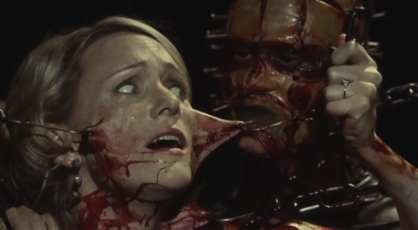
Overall Body Count: 8.
Best Kill: One of the movie’s few legit moments is when Steven’s dad shoots and kills Nico-Steven, depriving Pinhead of his ability to reclaim Nico. And thus pissing Pinhead off. That’s kinda neat. Well played terrible movie, well played.
Best Cenobite That Isn’t Pinhead: Mini Pinhead.
Best Badass Pinhead Line: No chance. Not applicable.
Best Whimsical Pinhead Line: Not applicable.
Stupidest Pinhead Line: This isn’t fairly applicable either, as all of Pinhead’s lines seem stupid now that Doug Bradley isn’t saying them.
Most Unpleasant Moment: Hitting play on my remote.
Should There Be a Sequel: You fuckers seriously better stop. Seriously. This isn’t funny anymore. Just reboot the damn thing or move on to something else. Leave me alone!
Franchise Assessment: Hellraiser is a weak franchise, considering how long it has kept chugging along. As CHUD’s message boards have proven, after Hellbound the franchise immediately became niche even within the already niche horror genre. The primary problem, as we’ve already discussed, was mostly due to the fact that the first two films failed to establish a formula. All Friday the 13th fans expect from that franchise is for Jason to show up and kill 99% of the characters in a variety of silly ways. You can rinse and repeat the shit out of that formula (and they did). Hellraiser‘s greatest virtue – being unorthodox – was also its greatest flaw. It is impossible to have our Pinhead cake and eat it too. Hell on Earth tried valiantly to create a formula for the franchise. No one liked the formula. So the series was essentially set adrift into its own nebulous mythology, forcing filmmakers to guess at what elements people really wanted. Things were probably kept in check by Doug Bradley’s, well, checks and the decreasing budgets for the films. While Nightmare on Elm St kept adding more and more Freddy, after Bloodline Pinhead kept mostly to the background. Which I suppose was both good and bad, overall. Though, by Deader I realized I could totally go for a stupid Hell on Earth too-much-Pinhead scenario.
Hellraiser, as a franchise, needed a “thing.” Freddy became all about the increasingly elaborate dream sequences. Jason became all about the bigger and more ridiculous kills. Leprechaun all about the silly settings. Sadly, I think Hell on Earth had its eye on the right ball, but bungled the execution. Fans should’ve been showing up for Hellraiser movies to see what Pinhead’s newest Cenobites would be like. A couple of the sequels, namely Bloodline and Inferno, played with this, though Inferno‘s budget kept it from having particularly good Cenobites. Honestly, I don’t know how this new Cenobite situation could have or should have been handled so it didn’t feel stupid, but most horror franchises evolve into a stupider frame of mind anyway; it is hard to maintain an air of seriousness after your villain has been defeated and returned yet again for the fourth or fifth time.
The franchise also failed to dig deeper. I hate when sequels retcon backstory (I’m looking at you Jason Goes to Hell), but Hellraiser is a dense universe with the kind of ambiguous mythology that should have allowed for exploration. We should have gone international more often, dealt with a character like Frank searching for the puzzle box. Hell, I’m sure it would’ve been terrible, but I could have even gone for one from Pinhead’s perspective. Hellworld, with its meta approach, should have been a series highlight, at least as far as mixing things up, but it wound up rote nonetheless. To use an X-Files analogy, Hellraiser needed a Darin Morgan episode.
Franchise ranked in order of best to worst:
Hellraiser
Hellbound
Hell on Earth | Bloodline
Inferno
Deader | Hellworld
Hellseeker
Revelations
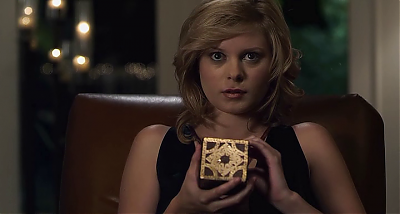
Up Next: What say you, Chewers? I had originally been planning to do Halloween this month before Fantastic Fest threw off my whole schedule. Now that October is over, I’m looking to take a break from horror for a moment. How do you feel about The Muppets?
DISCUSS THE FRANCHISE ON THE BOARDS
previous franchises battled
Critters
Death Wish
Leprechaun
Phantasm
Planet of the Apes
Police Academy
Rambo
Tremors